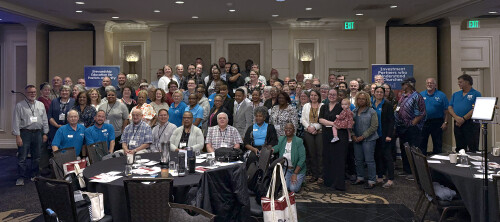Graduates of Financial Leadership Academy gain stewardship tools to tackle church finances
 About 10 years ago, the employees at the Mid-Atlantic Faith Foundation realized a problematic throughline among clergy.
About 10 years ago, the employees at the Mid-Atlantic Faith Foundation realized a problematic throughline among clergy.
Many of them were struggling with church finances and the myriad of duties that follow from it, such as raising funds and encouraging generosity. In many cases, pastors were giving complete control of church finances to lay leadership and finance committees.
“When pastors come out of seminary, they might have had one class that talks about church finances, but very rudimentary,” said Annabel Lusardi, acting executive director of the Mid-Atlantic Faith Foundation. “They are then appointed to serve a congregation where oftentimes they step into financial situations that they are absolutely ill-equipped to deal with.”
In response to such a need, the foundation created the Financial Leadership Academy, and on October 1, the academy held its graduation with 85 graduates. Of those 85 graduates, 45 were from the Baltimore-Washington Conference, as well as cohorts from Peninsula-Delaware and Eastern Pennsylvania.
Over 18 months, students spent five sessions going over their own personal relationship with money, how to raise money and strategies for capital campaigns, long-term financial planning and creativity in finding revenue streams for congregations.
Across U.S. churches nationally, a majority of churches report being in a good financial spot compared to their position five years ago, according to a report from Faith Communities Today. But nearly 40 percent of churches operate with little room for error.
Fourteen percent of congregations have an exactly balanced budget, while nearly a quarter of churches operate at a deficit, with nearly 17 percent spending five percent more than their income.
Lusardi emphasized that money is essential to do ministry, from simply keeping the lights on to being an active presence in the community.
“You can’t avoid talking about money, if you’re going to do that,” Lusardi said. “You need to be able to challenge your congregation to be generous, to make it clear to the congregation that generosity is a spiritual discipline that they need to cultivate.”
‘It’s okay to ask’
Rev. Kimberly Jenkins said oftentimes financial leadership is not in the wheelhouse of ministers. One of the most important lessons for her throughout the Financial Leadership Academy was giving herself permission to ask.
“Seminary prepares us for a lot of things, but the financial piece of it is not always something we’re well-prepared for,” Jenkins said. “It is not usually part of our giftedness when we’re called to be a pastor. Yet, it is a big part of our responsibility.”
In fact, when Jenkins was appointed to Glendale United Methodist Church, in January (six months before she even started in her role), her soon-to-be congregation made her aware of a problem: they needed an A/V system to get online.
A person eventually reached out to discuss the possibility of a large donation and what needs the church had. Jenkins was given the opportunity to ask for such a donation to be directed to a major need for the congregation, in order for them to get online and reach more members of the community.
For those interested in the academy, Jenkins explained that a person leaves with a mountain of resources and connections to navigate run-of-the-mill pastoral issues and money matters.
“To be resourced like that, to feel like you have an entire support system behind you, whether you need encouragement to do pastor things or whether you’re looking for specific guidance on a project, there’s this entire system out there.”
Laretta Wilson, a certified lay minister at Mt. Joy United Methodist Church, learned the importance of generosity and how to help individuals find it.
“Giving is more about generosity; it’s a heart thing more than it is a money thing,” Wilson said. “People pour into what they care about. Generosity comes from the heart, so you have to appeal to people’s hearts to motivate them to give and truly show them how their donations benefit others. They’re giving to be a help to someone else.”
One day, the Financial Leadership Academy gave Wilson the chance to make that appeal.
Wilson joined the Financial Leadership Academy as her congregation began a capital campaign for a building expansion. One of the financial coaches who works with FLA students offered for her to speak about her church’s capital campaign.
After sharing her story, she made the ask and appealed to the room’s generosity. The people in that room raised $4,000 for her capital campaign. That experience was one part of multiple lessons that FLA gave to her, as she worked to better understand how to be as effective as possible in her church’s undertaking.
“I wanted to have a better understanding of how to appeal to other people about giving,” Wilson said. “I figured this would give me some tools to help my pastor in helping approach our congregation and outsiders about helping us to make our vision become a reality.”
To learn more about the Mid-Atlantic Foundation, visit: https://midatlanticfoundation.org/.
